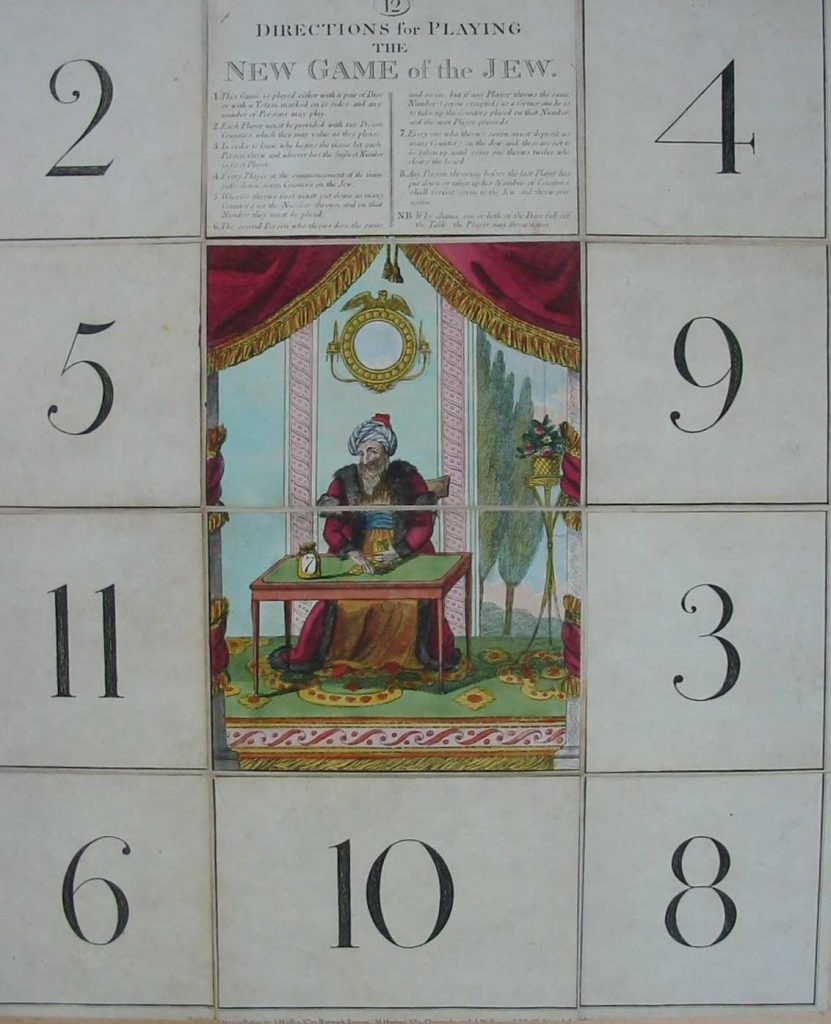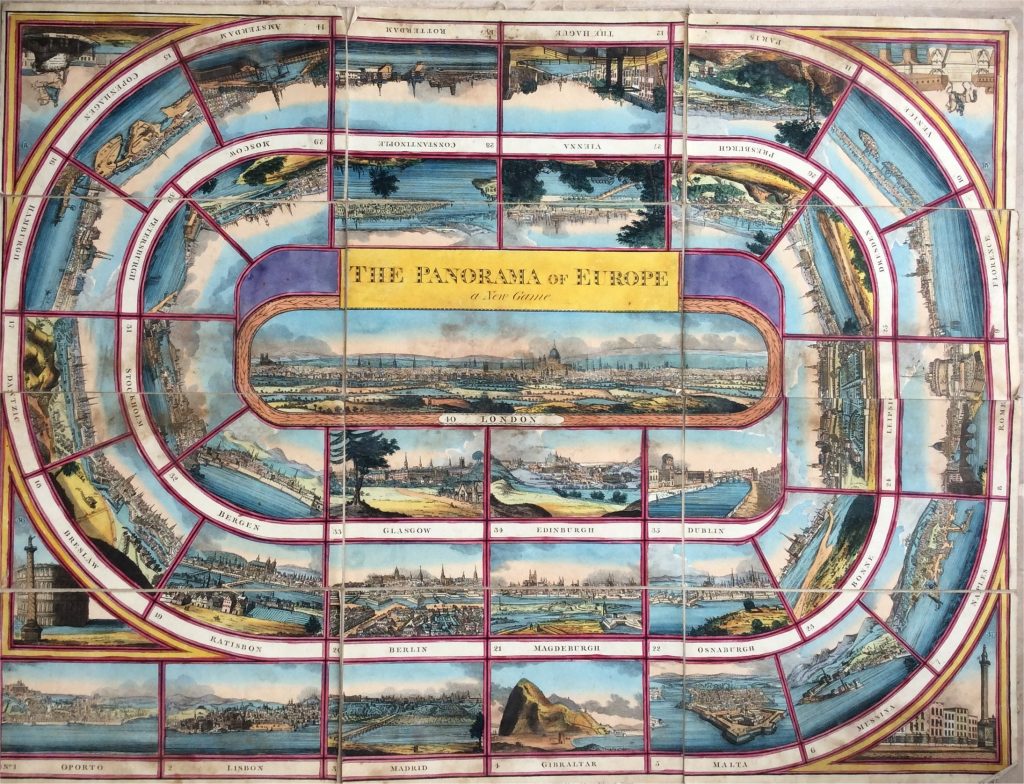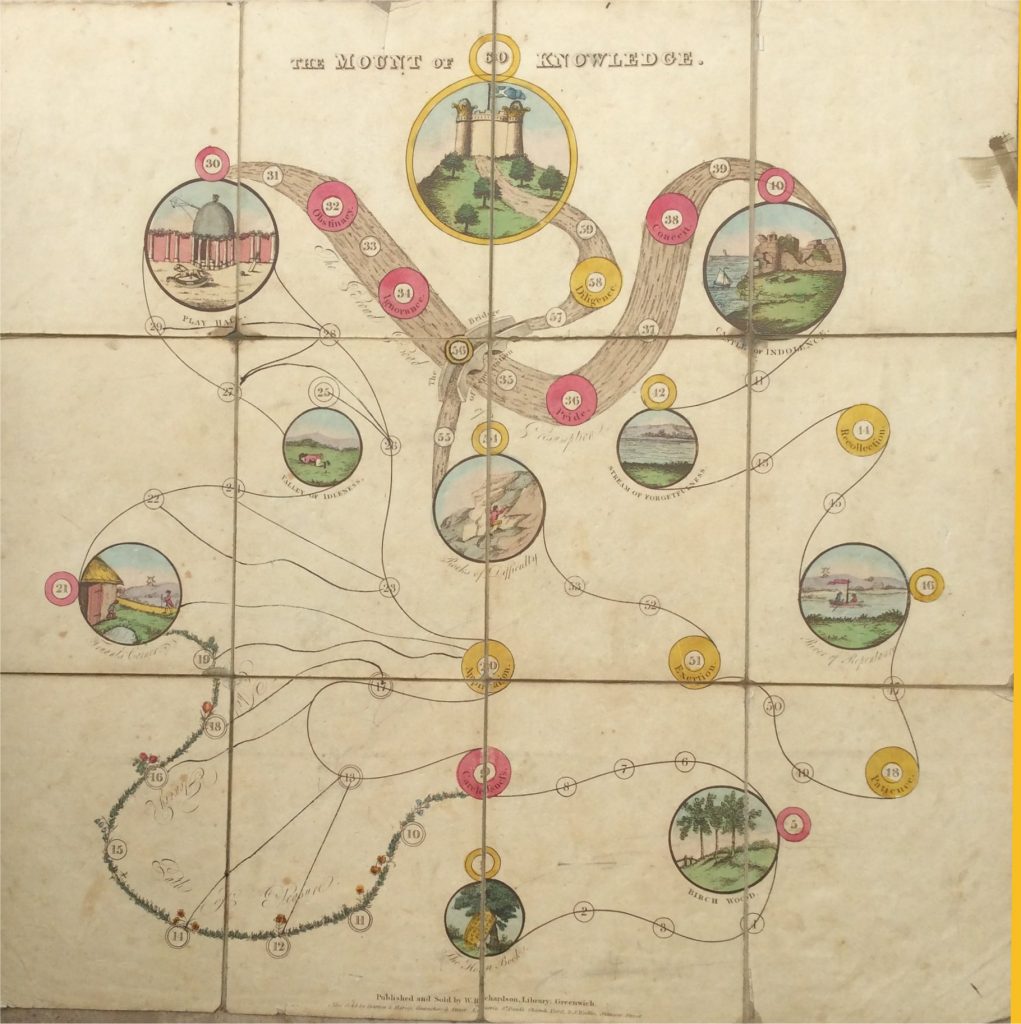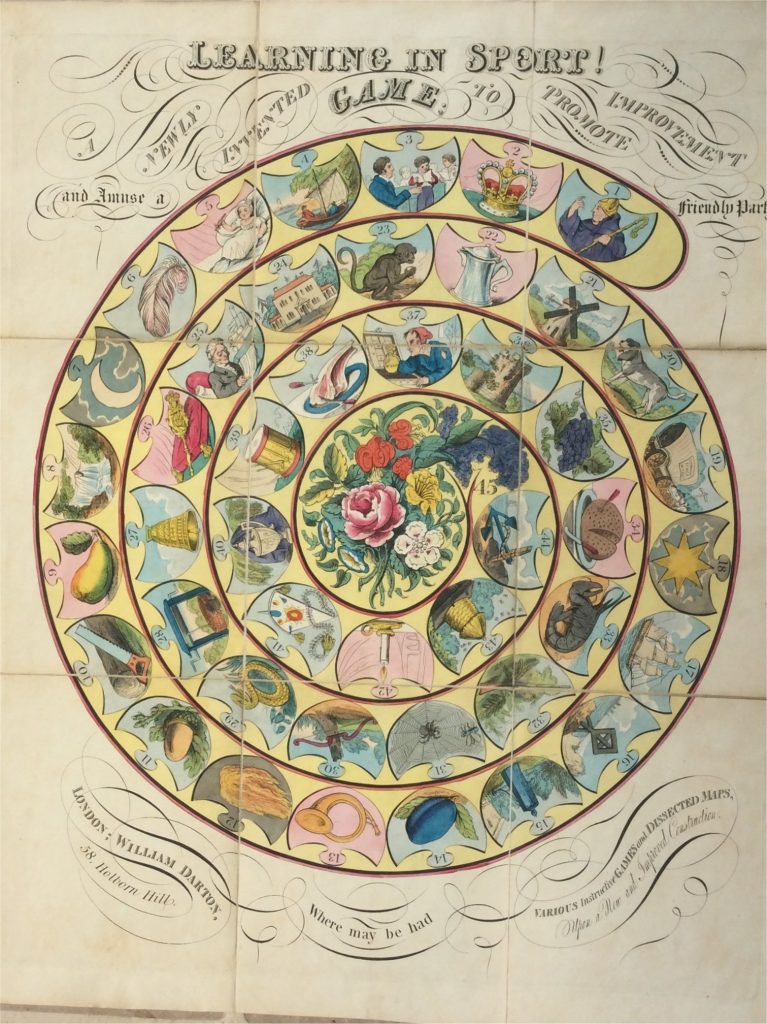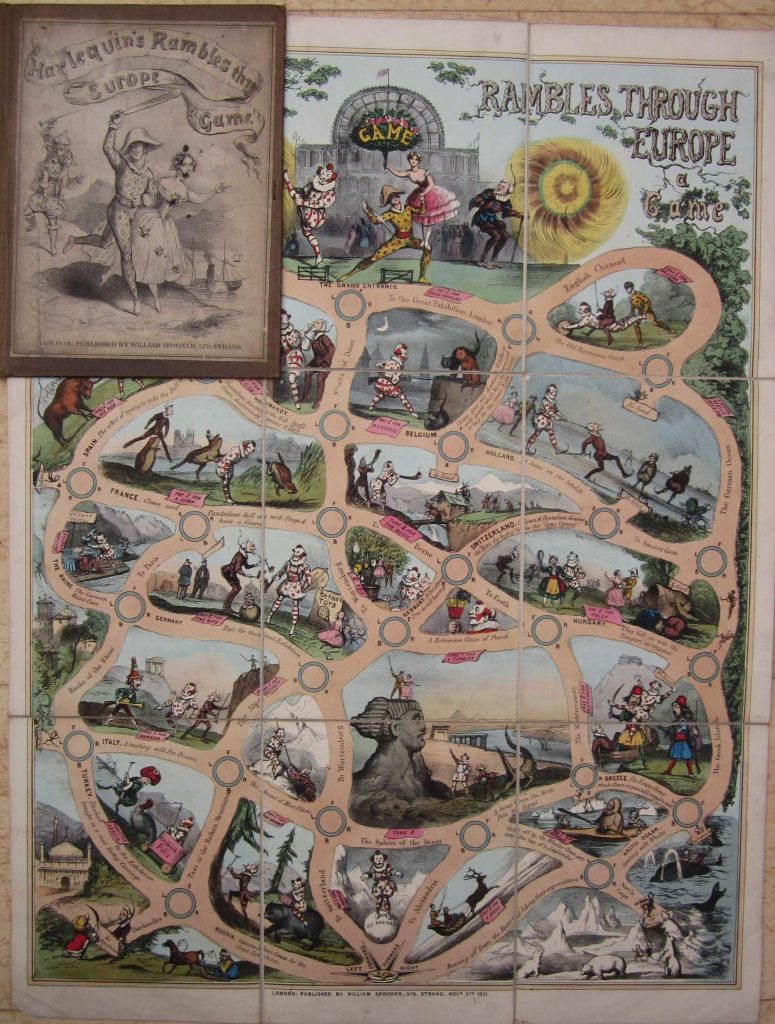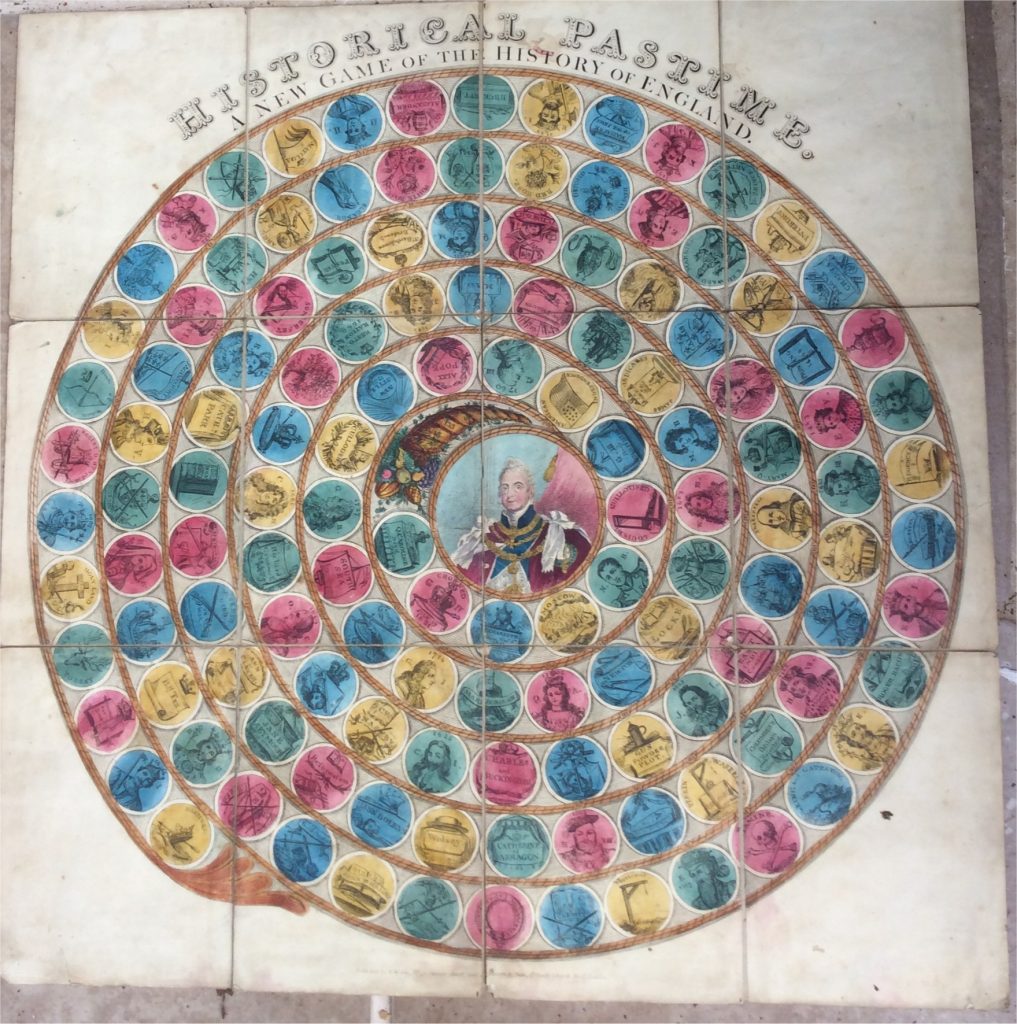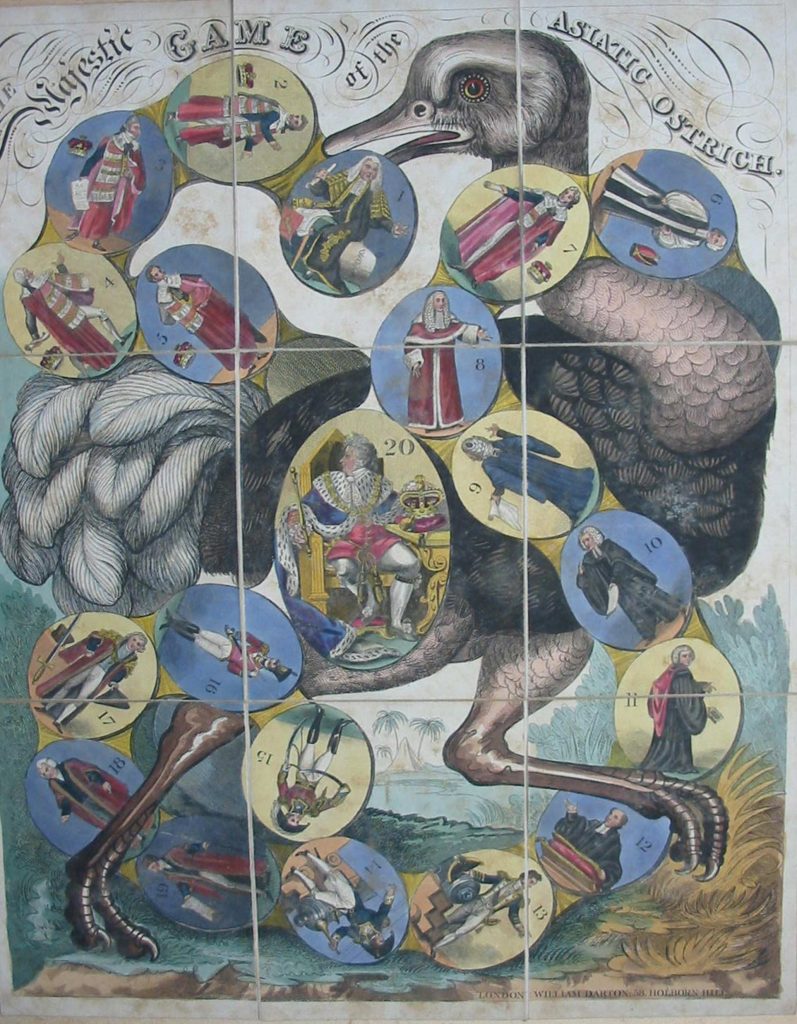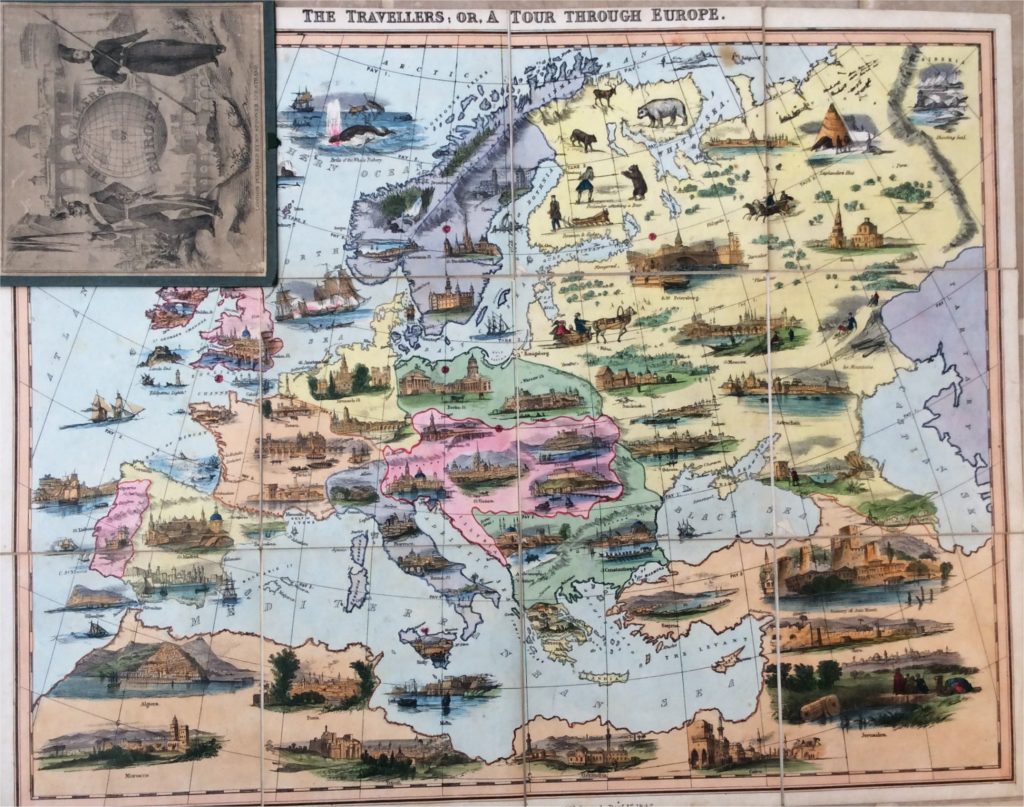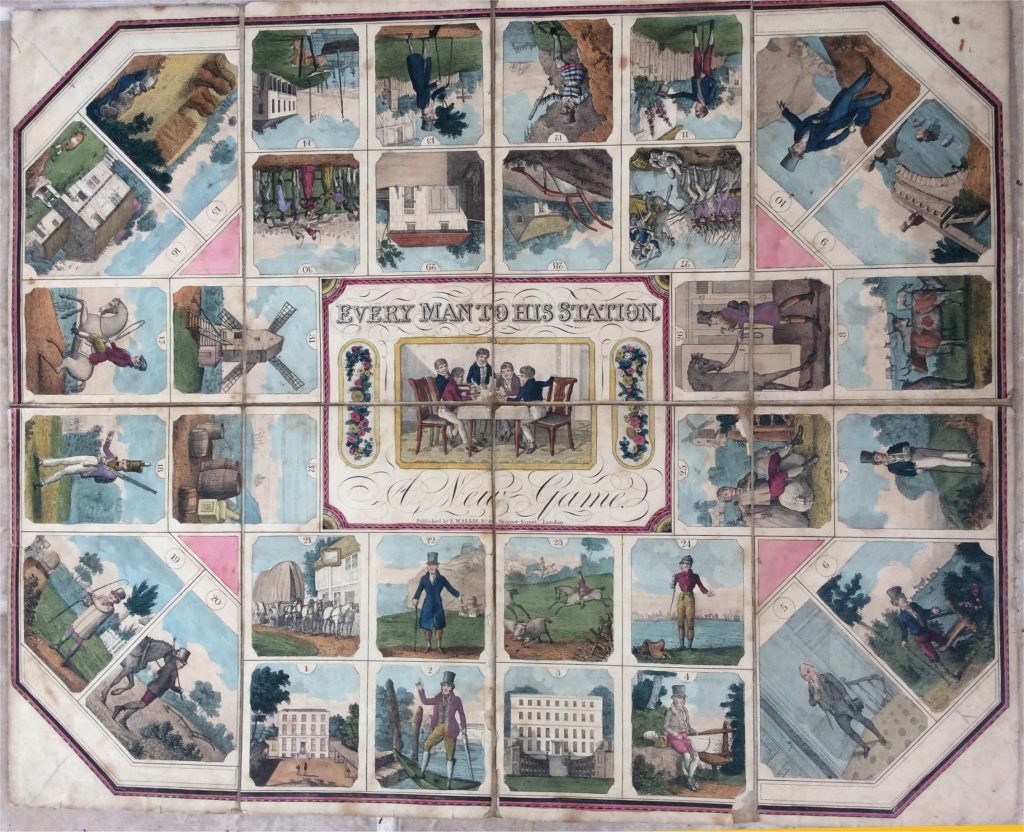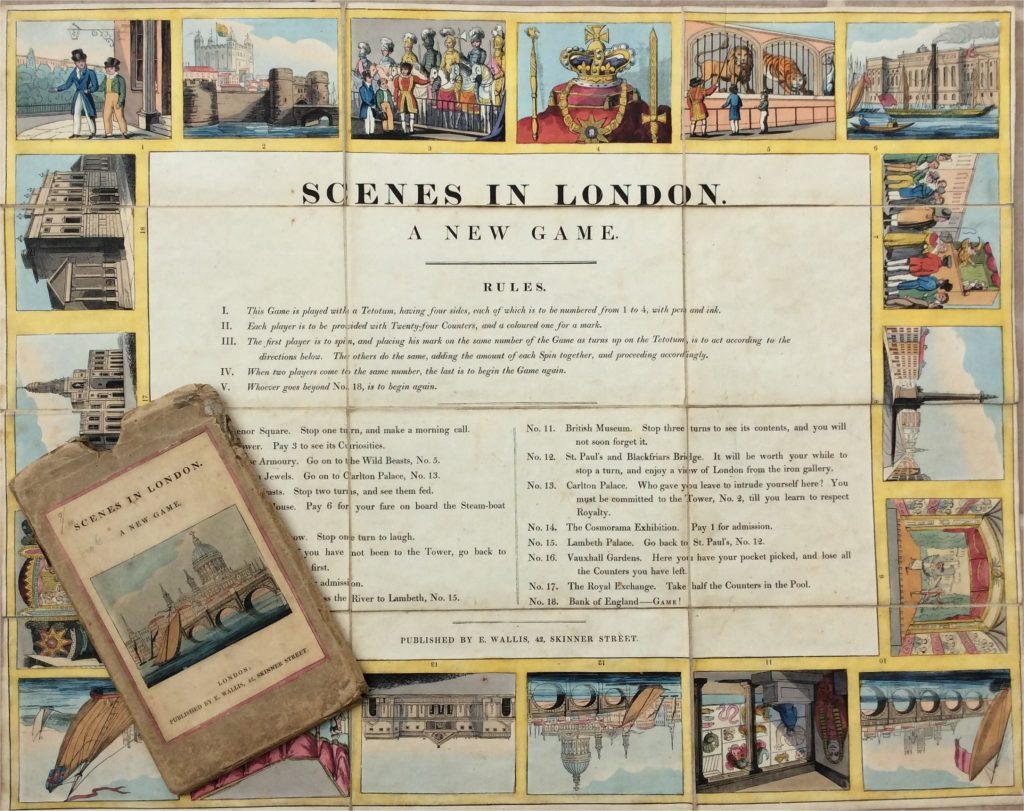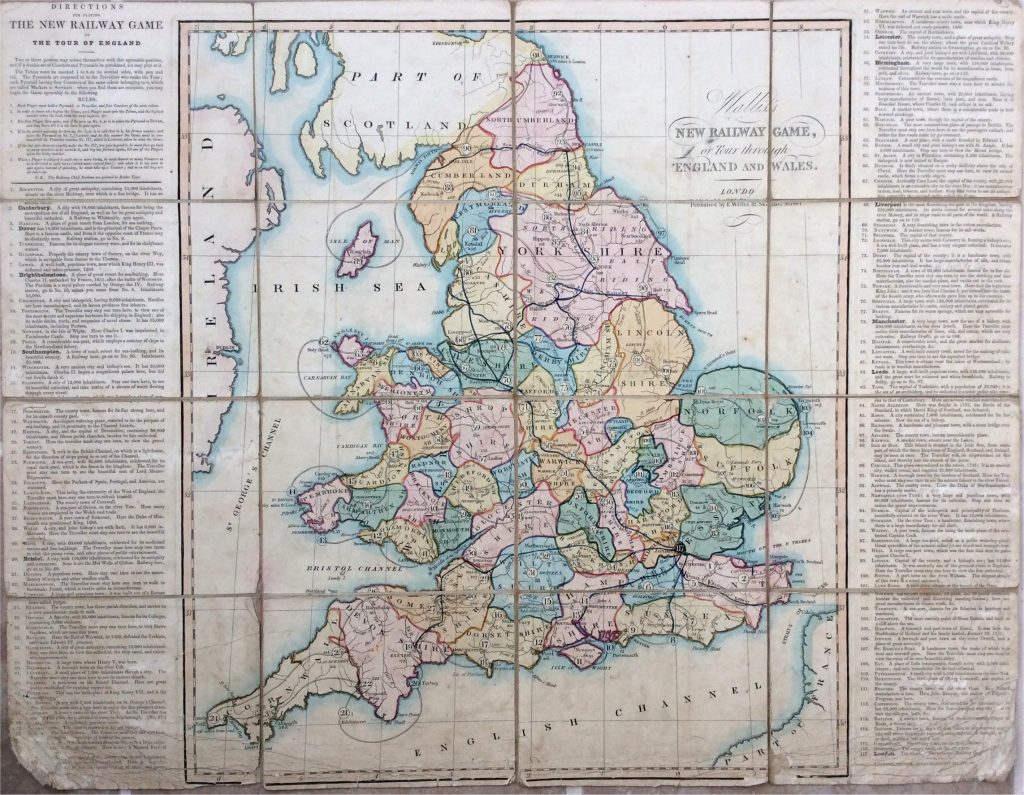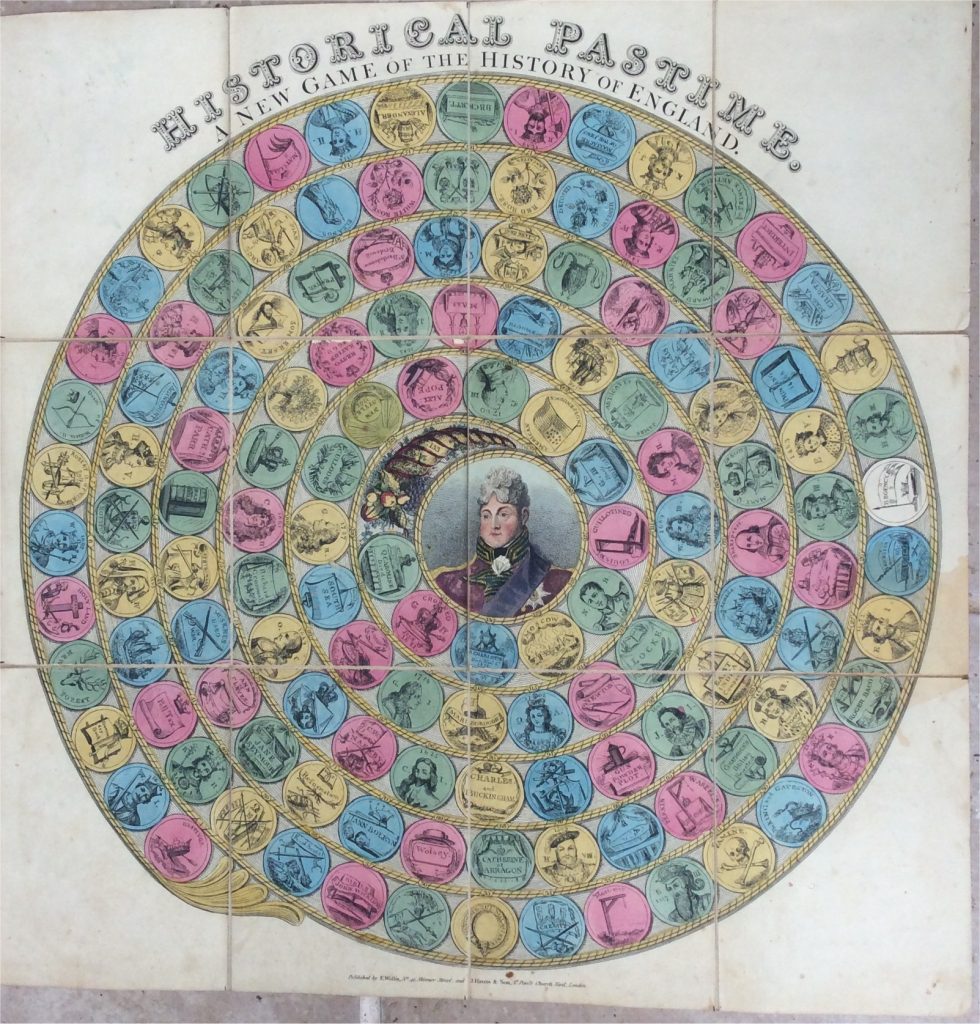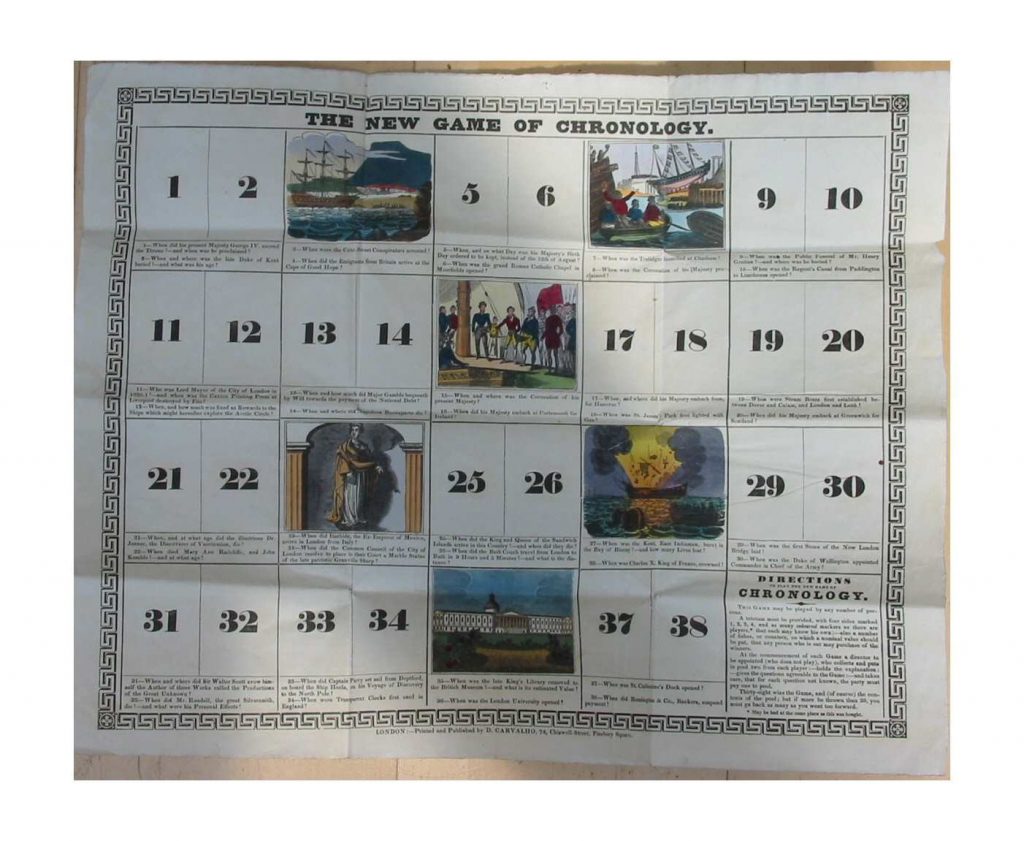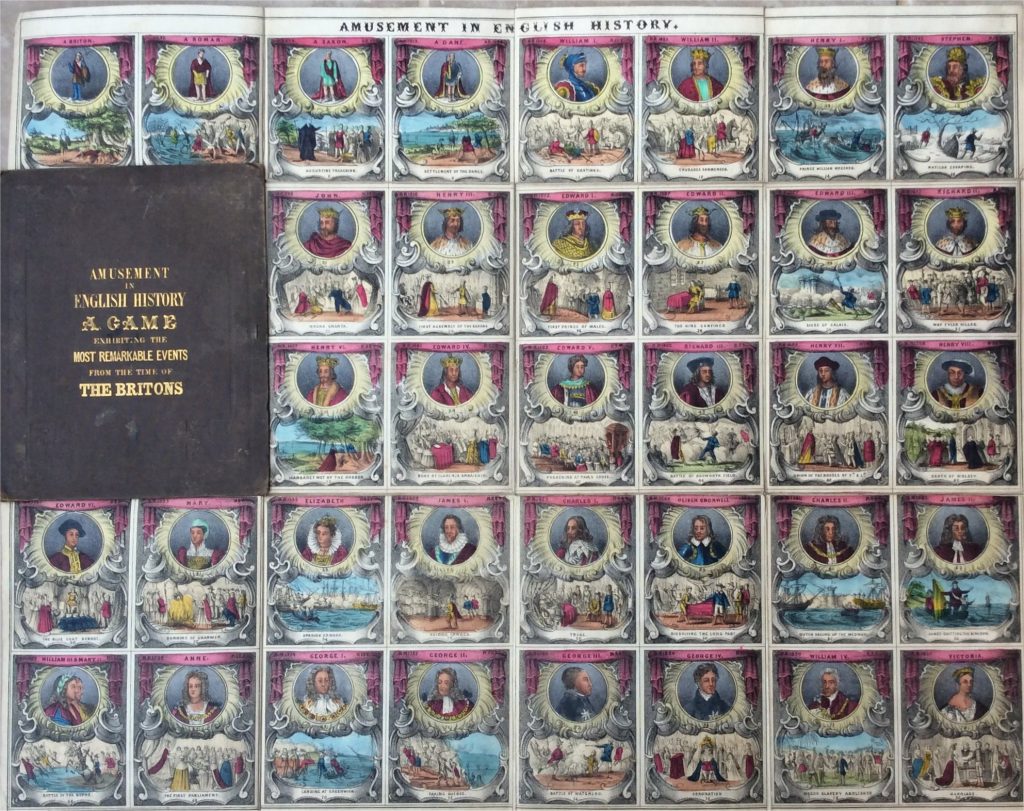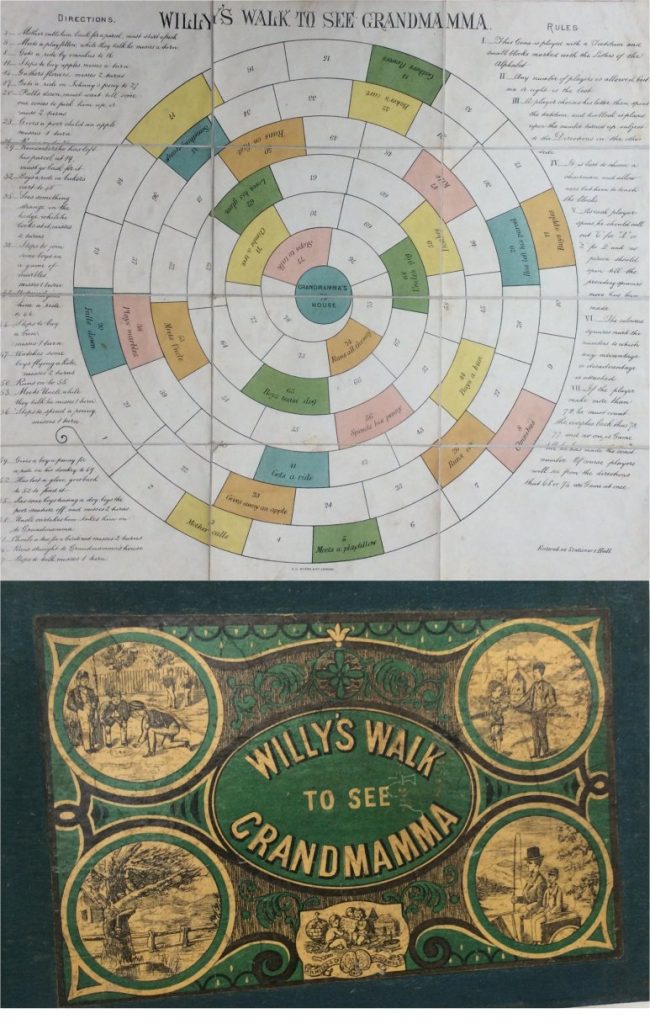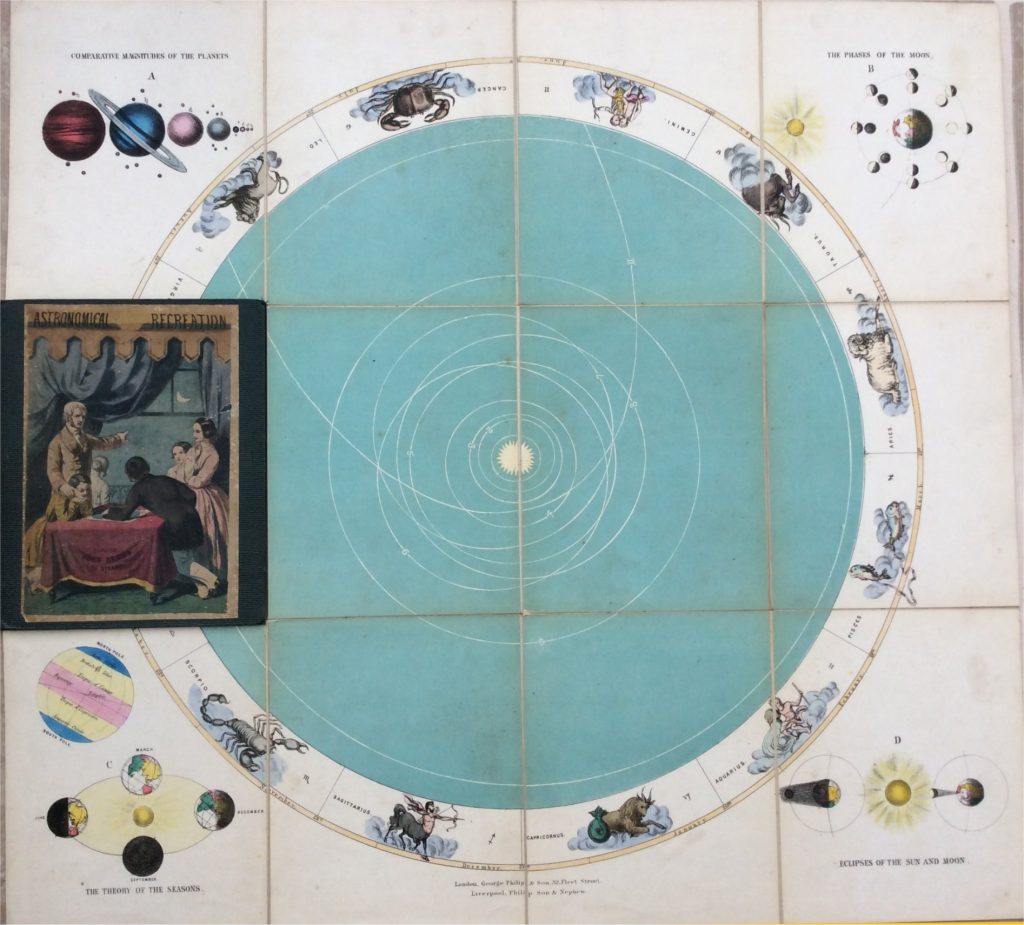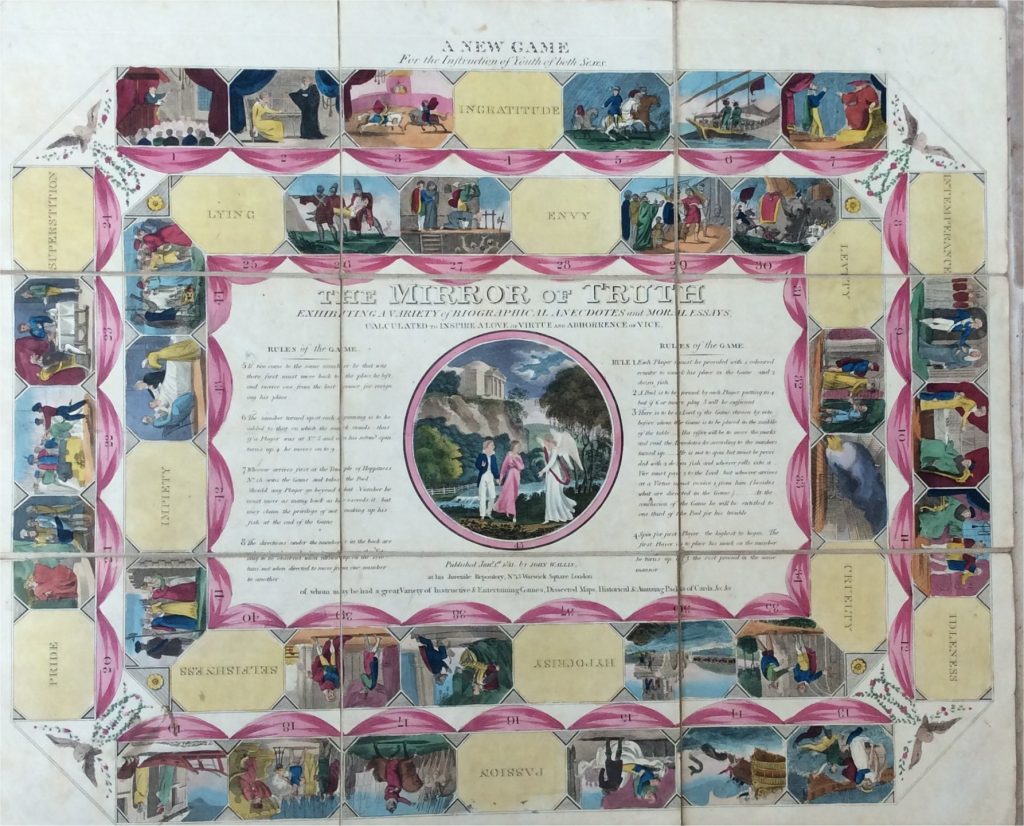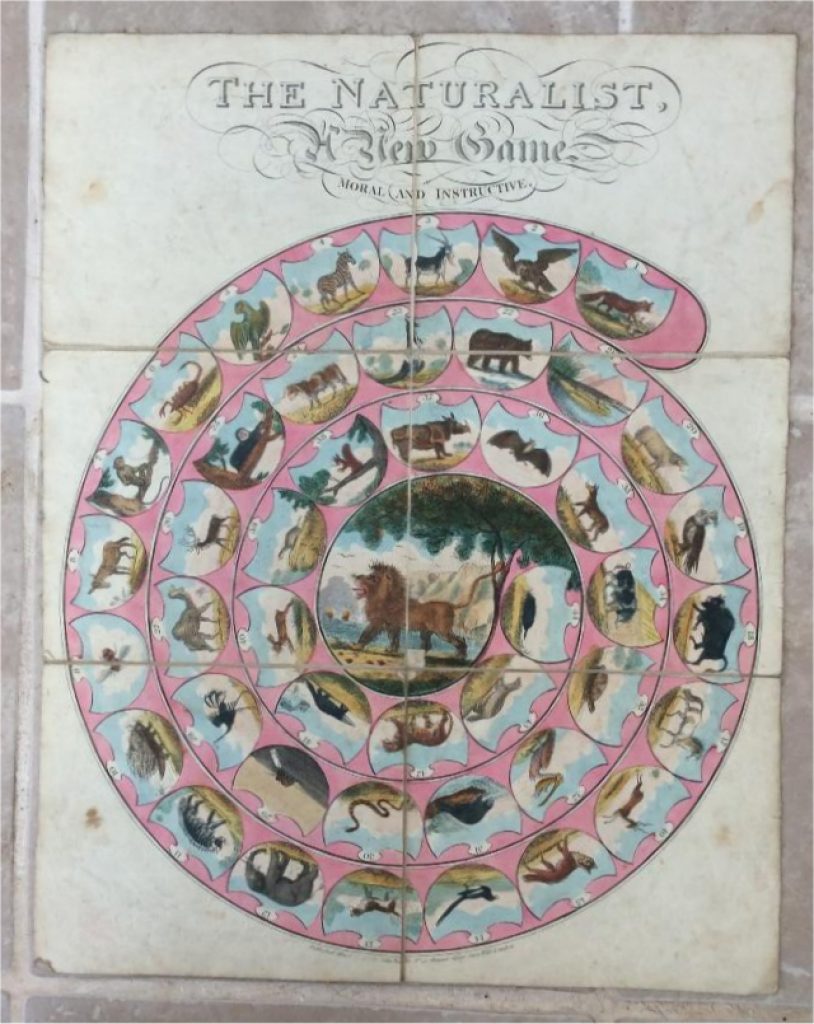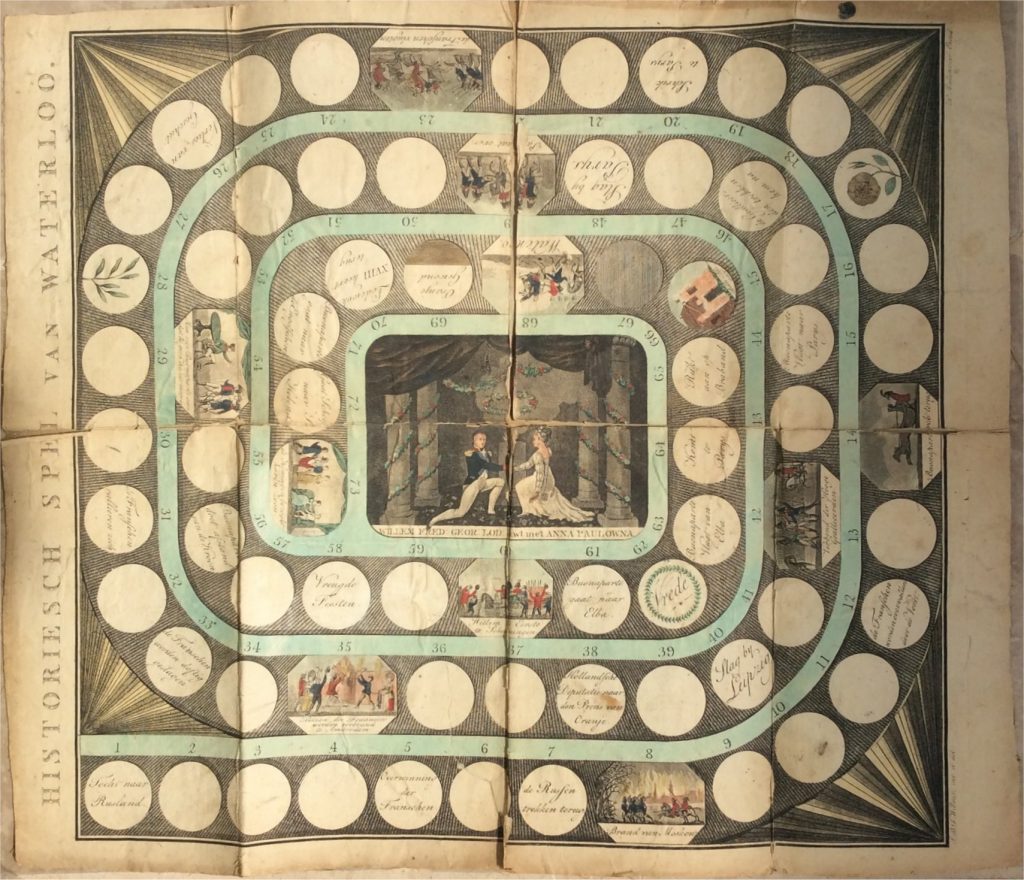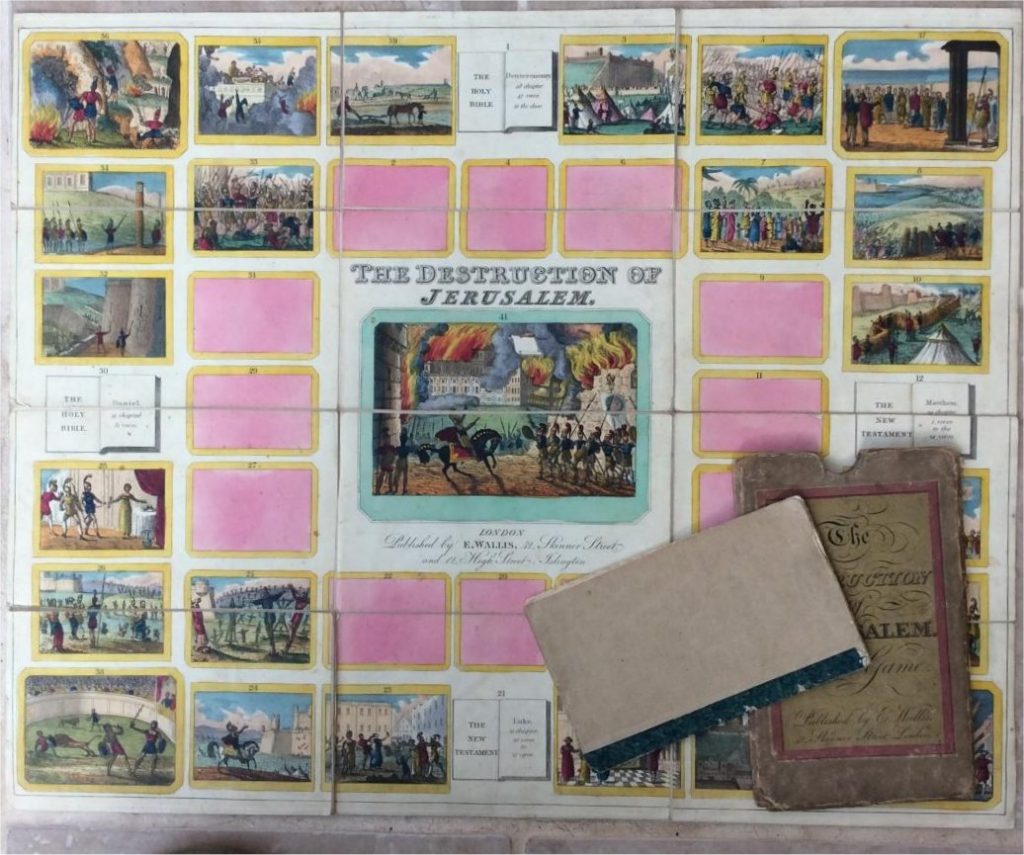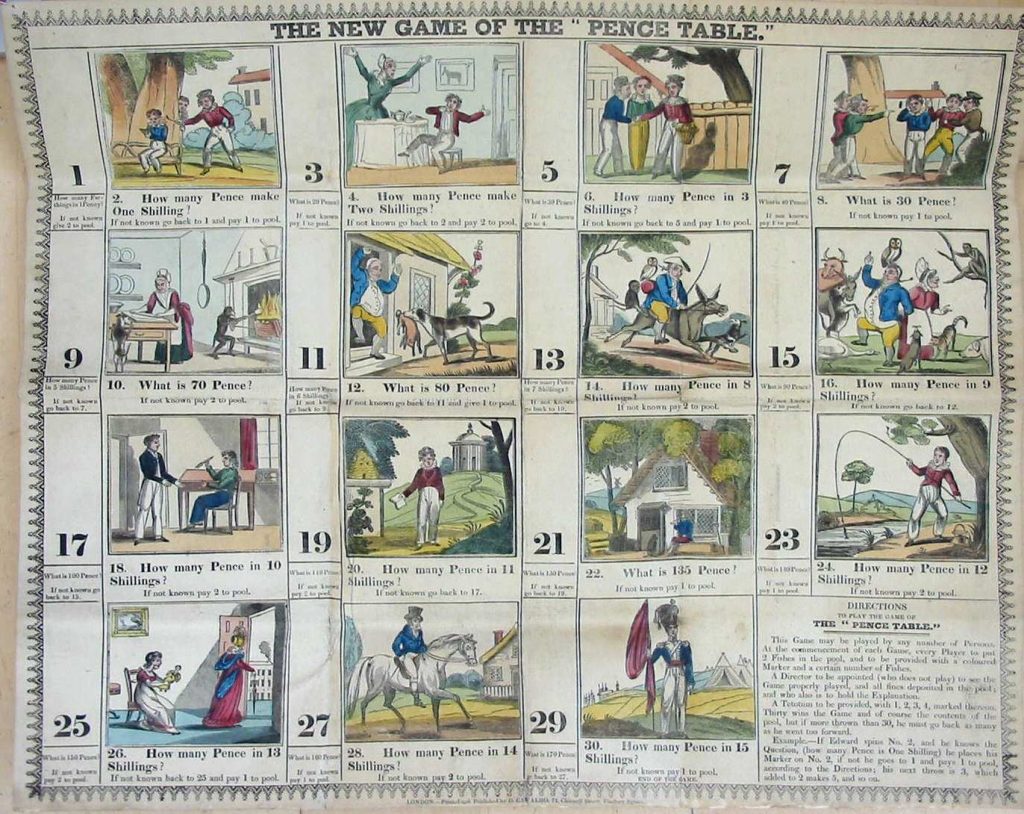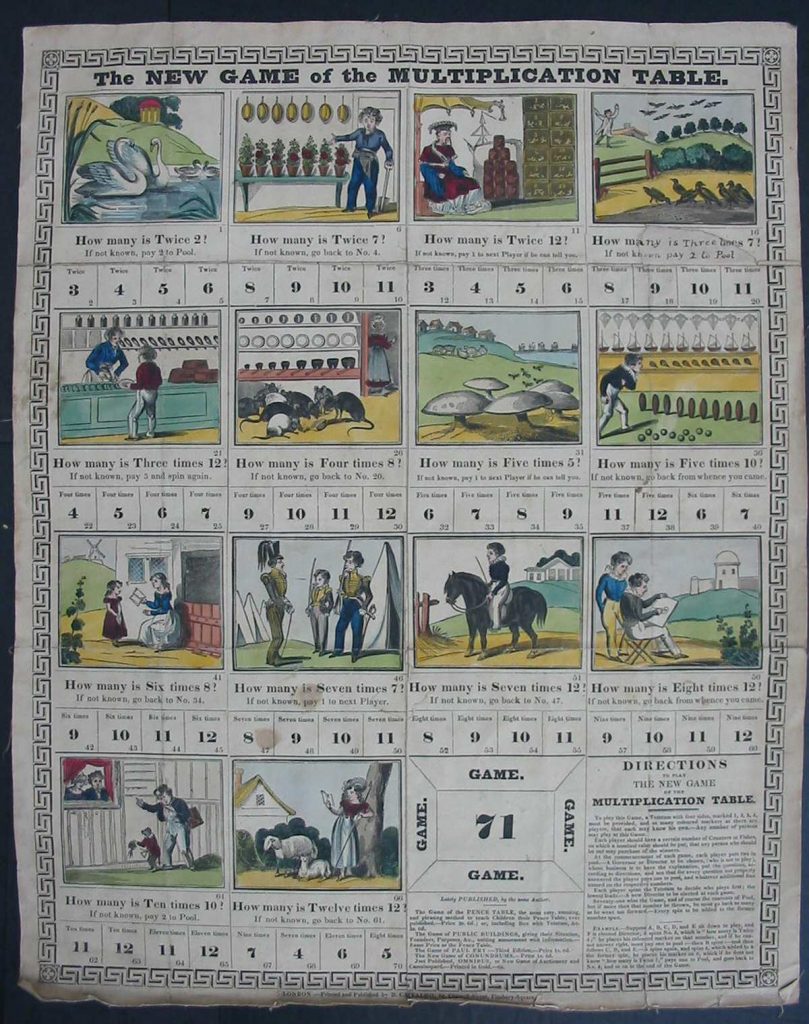Linen Backed Table Games / Amusement & Education / 1760-1850
1807 - The New Game of the Jew - Wallis, Dunnet and J Wallis
Published by Edward Wallis, M Dunnet and J Wallis Junr on 27 May 1807.
A beautifully colored picture at the centre of this interesting and early game.
The New Game of the Jew – Condition / Slipcase – very good condition – with a hand colored picture on the front – slight scuffing but otherwise very good / Rules are on the sheet / Playing Sheet – very clean and bright / no damage
Postage / As postage often changes it will be provided at time of purchase. Postage will be at cost rounded up to the nearest £1.00 to cover packaging.
CLICK IMAGE FOR A LARGER PICTURE
1815 - Panorama of Europe J & E Wallis
J and E Wallis 12 Skinner Street, London and J Wallis Jnr Marine Library Sidmouth, Devon
This shows pictures of the 40 most important towns in Europe. It is beautifully drawn with very detailed art work – Hand coloured
Condition: Panorama of Europe / Playing sheet – Vibrant colors in good condition –
The paper is seperating from the linen at some of the folds, there is no damage (just weak glue). / Slipcase is scuffed and there is a small hole on one edge – engraved colored label is good / Rules – photocopy
Postage / As postage often changes it will be provided at time of purchase. Postage will be at cost rounded up to the nearest £1.00 to cover packaging.
CLICK IMAGE FOR A LARGER PICTURE
1800-1810 - The Mount of Knowledge
The Mount of Knowledge (1804) taught that education was a hard-fought process and good decisions would lead to “the mount of knowledge,” but bad decisions would take one back a few steps.
Players start on space one (the Horn Book) and would begin to learn their letters.
On their next roll, they can move forward on the board (signifying that they learned their letters).
But, the players had to be careful what spaces they landed on, as some of them signified the folly common among young students, such as carelessness, truancy, and idleness.
From V&A web site – the only other version we have found.
“Published and sold by W Richardson, Library, Greenwich; J Harris St. Paul’s Churchyard (1801-1843) and J Wallis, Skinner Street. (Skinner Street address used 1812 to 1847). The game may be 1810-20 rather than earlier.
The sheet was also sold by Darton & Harvey (1791-1810), Gracechurch Street.”
Condition – Mount of Knowledge / Sheet Stained and a little grubby as per the picture / Slipcase – Original label possibly later case – scuffed and faded; the Title is legible with hand written additions / rules lacking – but a photcopy is available and can be printed from the V&A web site, which explain every circle. Additional pictures on request
Postage / As postage often changes it will be provided at time of purchase. Postage will be at cost rounded up to the nearest £1.00 to cover packaging.
CLICK IMAGE FOR A LARGER PICTURE
1820 - Learning in Sport - Darton
A Newly Invented Game To Promote Improvement And Amuse a Friendly Party
A very rare game paper on linen, hand painted, with 45 circles that link to the 72 page book that accompanies it
There are fascinating details about each picture
ie “when were windmills were first used” – the answer -” in 1299” – It was played with an 8 sided sided teetotum (included)
Condition – Learning in Sport / Sheet – excellent – no damage or marks / Rule booklet – excellent no damage / Slipcase – very good slightly rubbed and lightly scuffed / teetotum a little grubby.
Postage / As postage often changes it will be provided at time of purchase. Postage will be at cost rounded up to the nearest £1.00 to cover packaging.
CLICK IMAGE FOR A LARGER PICTURE
1851 - Harlequin's Rambles through Europe - Spooner
his game shows Harlequin’s Travels around Europe. Produced for the British Exhibition with a number of reference to collecting items for the exhibition. Very pretty and rare.
Condition / The Playing Sheet is very good / Rules are in the cover – good / Cover some light scuffing otherwsie very good.
Postage / As postage often changes it will be provided at time of purchase. Postage will be at cost rounded up to the nearest £1.00 to cover packaging.
CLICK IMAGE FOR A LARGER PICTURE
c1855 - A Ride Through London - J.A. Reeves Dartford Kent
The ride commences at the Tower of London and follows the path of the Thames moving west.
The cover displays the Royal Mail Coach
The game probably first appeared c1845- the last mail coach was delivered in 1847, and the Royal Exchange was completed in 1844.
Starting at Tower Hill ending at Buckingham Palace showing various buildings in London.
The front is a lithographed pictorial circle containing the title and a coach hitting a gas lamp
Played with : markers, counters, 6 cards marked respectively from 1 to 6 (in place of a teetotum) and 5 cards lettered respectively from A to E
The aim to reach Buckingham Palace
Any player falling into Prison, N°28, to lose a turn,.
Any player meeting with a break down, No. 42, to go back to the Hospital, N°32, for medical treatment.
Ther are other hazards along the way.
Whoever first reaches N°50 takes the pool excluding 3 counters, the player arriving second takes 2 and the third, the remaining one.
Places passed along the route are: The Tower, St. Paul’s, Temple Bar, National Gallery, Westminster Abbey, Royal Exchange, General Post Office, British Museum, Horse Guards, Buckingham Palace.
A later printing include an advert for the game Russia vers Turkey and the Crimean war that started in 1853.
Places passed along the route are: The Tower, St. Paul’s, Temple Bar, National Gallery, Westminster Abbey, Royal Exchange, General Post Office, British Museum, Horse Guards, Buckingham Palace.
The Price was 1/- plain; 1/6d coloured.(ref V&A)
Condition – The bookstyle cover houses the playing sheet and the rules – all in good condition (more pictures availabe if required)
Postage / As postage often changes it will be provided at time of purchase. Postage will be at cost rounded up to the nearest £1.00 to cover packaging.
CLICK IMAGE FOR A LARGER PICTURE
1820 - Historical Pastimes - George IV- E Wallis & J Harris
Historical Pastime or a New Game of the History of England from William the Conquest to the Accession of George the Fouth, 1820
J Harris and Edwd Wallis, London, England.
A historical race game with 133 playing spaces numbered in a clockwise direction from the Battle of Hastings [1066] to the death of Queen Caroline [1821] – horn of plenty is space 133. The central portrait is of King George IV.
This booklet describes each monarch and the important incidents in their reign.
Condition – Sheet – Paper lifting at centre fold – small tear bottom left, slightly grubby round the edges – Picture can be enlarged to see condition / Case complete – small split a front right grubby around the top / Rules booklet – good – sewn at back to keep it together
Postage / As postage often changes it will be provided at time of purchase. Postage will be at cost rounded up to the nearest £1.00 to cover packaging.
CLICK IMAGE FOR A LARGER PICTURE
1822 - The Majestic Game of the Asiatic Ostrich - William Darton
The game offers a lesson in Ranks and Dignities of the British Peerage, Clergy and Military; it was published in 1822.
The rules book (not present) includes a dedication to the future Queen Victoria.
This game is beautiful hand-coloured engraved, mounted in nine sections on linen, showing an Ostrich, with twenty egg-shaped portraits of dignitaries, clergy and men of military importance.
It was likely published to commemorate the recent coronation of George IV, depicted in the winning square at the center.
There are only two copies listed in museums.
Condition: Slipcase – a little dark but undamaged / manufacture’s label on the back / Photocopy of rules / Playing Sheet is very beautiful and in very good condition – no tears or paper damage – but there is some light foxing. On the back there is another advert for
“Darton’s Map Print and Chart Warehouse….Books of Roads and Fairs And Works highly necessary for the Traveller and the Man of Business”
Postage / As postage often changes it will be provided at time of purchase. Postage will be at cost rounded up to the nearest £1.00 to cover packaging.
CLICK IMAGE FOR A LARGER PICTURE
1842 - The Travellers of Europe - William Spooner - 1st edition
This is a first edition issued in 1842 by Spooner, from 379 The Strand.
It was revised about 1856, presumably to keep it fresh and up to date, which was common practice in this period.
The later version has larger pictures of the cities than the original within the same area – enhancing Europe’s power maybe?
Five players take the parts of The Travellers, who are from different nations, Austria, Sweden, Russia, Prussia and England.
They must make their way to their respective capital cities each starting from a different city in Africa, or on the shore of the Mediterranean Sea. They play with a teetotum or spinner with four sides marked N,S,E,W representing the directions they must move in
It is a beautiful colored game which shows pictures of animals, buildings in cities ships and lighthouses.
The art work is lovely and the pictures very detailed and very colorful “Perils of Whale fishery ” shows blood very brightly, volcanoes are also quite red.
Condition – Travellers of Europe / Sheet – very good, slight paper lifting on 3 folds but no damage, small mark above the “White Sea” / in a bookstyle cover which is undamaged (one of the two ties still present). The engraving is on the cover is fading a little
Postage / As postage often changes it will be provided at time of purchase. Postage will be at cost rounded up to the nearest £1.00 to cover packaging.
CLICK IMAGE FOR A LARGER PICTURE
1823 - Every Man to his Station - E Wallis
The game would be played with a teetotum, markers and counters.
It has 33 illustrated playing spaces showing various houses, cottages and a windmill. Also portrayed are various occupations including a boatman, soldier, farm worker and jockey. The end space of the game in the centre of the sheet shows an illustration of five boys seated around a table. They appear to be playing a version of this game.
Condition / Playing sheet – small paper damage at the base folds / odd pencil marks on border / grubby / Rules from a recent reproduction / No slipcase
Postage / As postage often changes it will be provided at time of purchase. Postage will be at cost rounded up to the nearest £1.00 to cover packaging.
CLICK IMAGE FOR A LARGER PICTURE
c1825 The Scenes of London - E Wallis
A little unusual Game in that there are only 18 squares – each one with an action.
Each space depicts a different London landmark with an instruction to the player, tailored to that particular location.
The winning space is the Bank of England, though getting there is not without risk:
No. 16 Vauxhall Gardens – Here you have your pocket picked and lose all your Counters.
No 5: The Wild Beasts – Stop two turns and see them fed.
The Royal Menagerie at the Tower of London dates from the reign of King John, in the 13th century, when wild animals were kept for the entertainment of the Court. In later years, it became a popular attraction but was closed after several incidents when the animals escaped, attacking staff and visitors. They were moved to the new London Zoo in 1832.
No14: The Cosmorama exhibition – Pay 1 for admission.
Cosmorama was an entertainment in 19th century London, at which the public could view scenes of distant lands and exotic subjects through optical devices that magnified the picture.The first exhibition with this title opened in 1820 in St. James’s Street but moved to Regent Street in 1823
The case has a picture from the game on it, so the cases are not all the same – we have seen three different scences used – so presumably a whole sheet was cut up and all the scences used rather than one chosen to represent the game.
Condition / Sheet no damage, some use so odd small marks / Slipcase – A little worn at the edges but otherwise good-
Postage / As postage often changes it will be provided at time of purchase. Postage will be at cost rounded up to the nearest £1.00 to cover packaging.
CLICK IMAGE FOR A LARGER PICTURE
1840 - The New Railway Game or Tour Through England & Wales - E Wallis
This is published by E. Wallis of 42 Skinner Street, London, and printed by Passmore of Great Guildford Street, London
A linen-backed hand-coloured map showing the main cities and towns, linked by early railway lines, with descriptive details in columns on either side.
The New Railway Game – Condition – The map area is good and clean. Both the bottom corners look as if they have been rubbed/folded very badly, there is slight paper loss and wear that make the instructions difficult to read on the corners (area 3 by 2 inches). There is no damage on the folds. Some very light foxing. due to age. Slip case has the title plus a picture of a train on the cover, light wear at edges. All rules are printed on the playing sheet.
Postage – As postage often changes it will be provided at time of purchase. Postage will be at cost rounded up to the nearest £1.00 to cover packaging550
CLICK IMAGE FOR A LARGER PICTURE
c1830 - Historical Pastimes - William IV- E Wallis & J Harris
Historical Pastime. A New Game of the History of England [from William 1st to William 4th], 1831 – Edwr Wallis, J Harris
Game has 133 numbered playing spaces depicting a horn of plenty, leading to a central portrait of King William IV.
A game devised to educate young children in some of the basic facts of English history. It was originally played with an eight-sided tetotum 1-8 and twelve letters for players
Condition – sheet – dusty with some minor marks, slight wear to linen where folds cross. Picture can be enlarged to see condition
Postage / As postage often changes it will be provided at time of purchase. Postage will be at cost rounded up to the nearest £1.00 to cover packaging.
CLICK IMAGE FOR A LARGER PICTURE
1830 - The New Game of Chronology of King George IV - D Carvalho
A Game of Education and Fun based on events that occurred or originated in London.
Eg “When was the University of London opened?” “When was Trafalgar launched at Chatham?”.
38 questions – six lovely colored vinaigrettes depicting the answer
The New Game of Chronology of King George IV`s reign, up to December 31st, 1828
Condition: Slipcase – very good – slightly dusty – good colored label of two children playing / Rules are on the sheet – possibly an answer sheet would have been supplied originally / Playing Sheet is very good – almost unused.
This is paper only (not paper on linen)
Postage / As postage often changes it will be provided at time of purchase. Postage will be at cost rounded up to the nearest £1.00 to cover packaging.
CLICK IMAGE FOR A LARGER PICTURE
1840 - Amusement in English History - Sallis
English History in 40 pictures from A Brition, A Roman, A Saxon, A Dan, William I thro to Victoria.
Well colored pictures
Condition – English History / Sheet is very good, clean and little sign of use / Cover (booklike, so attached) is worn and split slightly at the spine, a little grubby with odd marks – title good and clear in gold lettering / Photocopy of rules available
Postage / As postage often changes it will be provided at time of purchase. Postage will be at cost rounded up to the nearest £1.00 to cover packaging.
CLICK IMAGE FOR A LARGER PICTURE
1869 - Willy's Walk to Grandmamma - AN Myers
A paper on linen game that is unusual for the period.
Instead of rewarding “good deeds” and punishing “selfish ones” as per early Snakes and Ladders – this does the opposite!!
Quote from the V&A
” forfeits are given for helping people or animals, while rewards are given for accepting a lift on a cart. In other games, the forfeit would be paid for this as laziness and the reward, usually counters, for the help”
The playing pieces for this game are unusual. They are made of glazed earthenware marked with the letters A to H on the tops.
Condition – Willy’s Walk – Complete – Sheet in good, clean condition / playing pieces undamaged / rules are on the sheet / Box – good and clean, but rubbed and scuffed in places
Postage / As postage often changes it will be provided at time of purchase. Postage will be at cost rounded up to the nearest £1.00 to cover packaging.
CLICK IMAGE FOR A LARGER PICTURE
1845 - Astronomical Recreation - J Betts
Published by John Betts 115 Strand
The slipcase shows a coloured lithograph by the Leighton Brothers from the cover of an educational game, showing a family examining a star chart and relating it to the night sky.
This game relates to a set of identification cards produced to instruct people in the recognition of star patterns in the sky. The game does not include the planet Neptune that was found in 1846
Astronomical Recreation – Condition: Slipcase is very good scuffed at the edges / Rules – Photocopy / Playing Sheet – odd very small spots and very light foxing
Postage / As postage often changes it will be provided at time of purchase. Postage will be at cost rounded up to the nearest £1.00 to cover packaging.
CLICK IMAGE FOR A LARGER PICTURE
1811 - The Mirror of Truth - John Wallis
Published by John Wallis, at his Juvenile Repository, no. 13 Warwick Square, 1811
This Moral and Biographical Game attempted to teach children about the good people and the full range of vices that could occur in the world.
The vices include
intemperance, idleness, selfishness, lying, envy, hypocrisy, passion, and pride
These attract payment of fishes, and missed turns
The virtues include
including Justice, Courage Integrity, Patriotism and Clemency
are supported with stories from life that support the actions
The Centre Piece is explained at the end as pointing out to two young people
“the path to the Temple of Happiness which is situated on a steep and lofty eminence, intimating that it cannot be gained without some labour and sacrifices”
Mirror of Truth – Condition / Playing sheet – very good and clean / Original Rule Booklet – good / Slipcase – Good – lightly scuffed at the edgess – no damage – More pictures availabe on request
Postage / As postage often changes it will be provided at time of purchase. Postage will be at cost rounded up to the nearest £1.00 to cover packaging.
CLICK IMAGE FOR A LARGER PICTURE
1813 - The Naturalist - E Wallis
The game is described as ‘designed to allure the minds of youth to an acquaintance with the wonders of nature’.
The playing surface has 37 playing spaces each containing an animal.
The animals featured include the otter, armadillo, beaver, sheep, rat, lynx, monkey and fox. The end of the game is marked by the lion, the king of all the beasts.
Title and date from game board.
Title only on the slipcase: Wallis’s new game of The Naturalist. Published July 25, 1813
The hand-colored, engraved sheet mounted in six sections on a single folded sheet of linen.
The title page of the 24 page booklet of rules reads:
Explanation to Wallis’s new game of The Naturalist. In which it describes each animal at length and both domestic and wild animals are discussed.
It is Printed for E. Wallis, 42, Skinner-Street, Snow-Hill
The Naturalist – Condition / Playing sheet – undamaged, good but with odd grubby marks on the background / Original Rule Booklet – good – odd pencil marks on some pages / Slipcase – Good – scuffed, with the paper lifting at the edges, the picture is good. More pictures available on request
Postage / As postage often changes it will be provided at time of purchase. Postage will be at cost rounded up to the nearest £1.00 to cover packaging
CLICK IMAGE FOR A LARGER PICTURE
1816 - Historical Game of Waterloo Napoleon (from Netherlands)
This shows the actions of Napoleon and the French Army from 1812 to the banishment of Napoleon in 1815
The centre shows the marriage
on 21 February 1816 at the Chapel of the Winter Palace in St Petersburg,
of Anna Pavlovna who married the Prince of Orange, later to become King William II of the Netherlands.
The marriage had been suggested by her brother the Tsar Alexander I in 1815,
as a symbol of the alliance created after the Congress of Vienna
Waterloo – The sheet has some splits on folds wth paper lifting – the picture shows the faults
Postage / As postage often changes it will be provided at time of purchase. Postage will be at cost rounded up to the nearest £1.00 to cover packaging
CLICK IMAGE FOR A LARGER PICTURE
1824 - The Destruction Of Jerusalem - E Wallis
It was published by E. Wallis, 42 Skinner Street, and 12 High Street, Islington.
This is a rare game, we only know of one other copy and that is in Yale University Library.
There are 25 colored scenes depicting incidents including
Cestius, the Roman general, pitching his camp,
Christians seeing the abominations of dissolution and Jerusalem compassed with armies flee to the city of Pella
Romans returning with greater force with 60,000 men
A star like a fiery sword hung over the city
The gate of temple opening without hands
The temple was burned against Titus’ orders but it could not be saved
Condition – Playing sheet – Hand colored very bright and clean, slight paper separation on one corner / Slipcase – rubbed, the back has paper separation, label good and easy to read / Original Rules – 12 pages – lightly foxed – undamaged. The rule booklet is dated 1824, (no edition) printed by T Davis 106 Minories.
Insured Postage Free
CLICK IMAGE FOR A LARGER PICTURE
c1835 - The Pence Table - D Carvalho
This, together with The Multiplication Table, were an attractive way of teaching children arithmetic.
Carvalho also published
The Infant’s Own Book which included this two titles. The pictures used for Multiplication Table were taken from both these titles . It seems like that these pictures were have been taken from elsewhere in The Infant’s Own Book.
The game is a colourfully hand colored and must have been fun to play, the answers are on the back of the slip case.
The Pence Table – Condition: Slipcase – good – some foxing on the front label –
“Explanation of The Game” (answers) on the back – scuffed and a little split at sides / Rules – on the sheet / Playing Sheet – excellent – Fifteen lovely pictures.
This is a sheet of paper onlinen – not cut into sections – so slight wear on the vertical folds
Insured Postage Free
CLICK IMAGE FOR A LARGER PICTURE
1830-32 - The New Game of The Multiplication Table - D Carvalho
This, together with The Pence Table, were an attractive way of teaching children arithmetic.
Carvalho also published The Infant’s Own Book which included these two titles. The pictures from both these titles were used this game – not all together sensibly in some cases.
A very colorful sheet with multiplication problems for children to solve
“By the author of Pence table, Public buildings, Trials of skill, Conundrums, &c. &c.”
Carvalho was active at 74 Chiswell Street from 1830 to 1832
The New Game of The Multiplication Table – Condition: No slipcase / Rules are on the playing sheet / Playing Sheet has a small repaired to one picture, otherwise good –
This is paper only (not paper on linen) It is very pretty – beautifully colored.
Insured Postage Free
